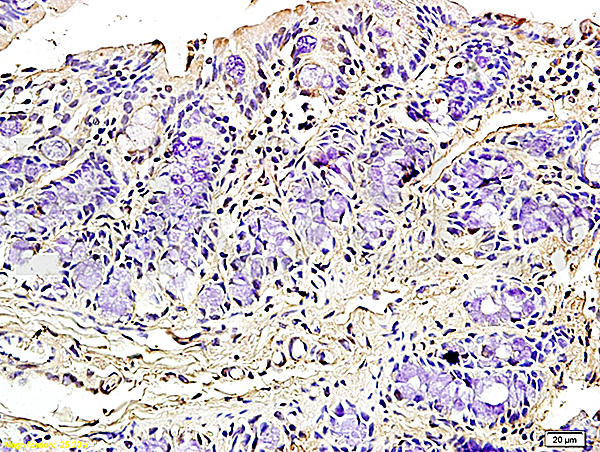Anti-Podoplanin (MAP tag) [PMab-1]
Ab00875-1.1
ApplicationsFlow Cytometry, Western Blot, ELISA, ImmunoHistoChemistry, Neutralisation/Blocking
Product group Antibodies
ReactivityMouse
TargetPdpn
Overview
- SupplierAbsolute Antibody
- Product NameAnti-Podoplanin (MAP tag) [PMab-1]
- Delivery Days Customer7
- Application Supplier NoteThis antibody binds to the PLAG domain of murine PDPN and is, therefore, able to block its interaction with C-type lectin-like receptor-2 (CLEC-2) (Yamada, 2017). This has a number of potential therapeutic applications, including the suppression of lymphangiogenesis and inflammatory macrophage infiltration at the site of wound healing in mouse corneal suture and ear section models (Maruyama et al, 2014), as well as suppression of transplant rejection. This antibody possesses high affinity and specificity for the MAP epitope tag (GDGMVPPGIEDK), and can, therefore, be used to detect and purify tagged proteins in a range of assay formats (Fujii et al, 2016). PMab-1 performs well in immunohistochemical analysis, and has been used to stain the mouse melanoma B16-F10 and mouse podoplanin-expressing CHO transfectants (Kaji et al, 2012). The use of this antibody in immunostaining of somatic tissues, including mouse lung lymphatic vessels, kidney glomeruli, pulmonary alveoli, pulmonary pleura and salivary gland myoepithelial cells, has been successfully performed on both paraffin-embedded sections and frozen sections (Kaji et al, 2012). The specificity of this antibody has been confirmed in Western blot analysis (Kaji et al, 2012), while Western blot analysis has also revealed that activation of LPS-induced inflammatory pathways, including the MAPK and NF-kappaB pathways, is affected by PMab-1 (Maruyama et al, 2014). The mouse-rat chimeric antibody mPMab-1 is derived from PMab-1 (Yamada et al, 2017).
- ApplicationsFlow Cytometry, Western Blot, ELISA, ImmunoHistoChemistry, Neutralisation/Blocking
- Applications SupplierELISA; WB; IHC; Block; epitope tag
- CertificationResearch Use Only
- ClonalityMonoclonal
- Clone IDPMab-1
- Gene ID14726
- Target namePdpn
- Target descriptionpodoplanin
- Target synonymsE11, Gp38, OTS-8, RANDAM-2, T1-alpha, T1a, T1alpha, podoplanin, PA2.26 antigen, aggrus, glycoprotein 38, transmembrane glycoprotein E11
- HostMouse
- IsotypeIgG1
- Protein IDQ62011
- Protein NamePodoplanin
- Scientific DescriptionThis chimeric mouse antibody was made using the variable domain sequences of the original rat format, for improved compatibility with existing reagents, assays and techniques.
- ReactivityMouse
- Reactivity SupplierMouse
- Reactivity Supplier NoteThis antibody was raised by immunising rats with 14-residue synthetic peptide mpp3851, which corresponds to amino acids 38-51 (GDGMVPPGIEDKIT) of the platelet-aggregation-stimulating (PLAG) domain of mouse podoplanin. Spleen cells were then harvested, and fused to P3U1 cells to generate stable hybridomas.
- Storage Instruction-20°C,2°C to 8°C
- UNSPSC41116161



![IHC-P analysis of 4% PFA fixed kidney and lung tissue sections from LPS exposed mouse using GTX53151 Podoplanin antibody [10C3].](https://www.genetex.com/upload/website/prouct_img/normal/GTX53151/GTX53151_20191119_IHC-P_w_23060900_214.webp)
